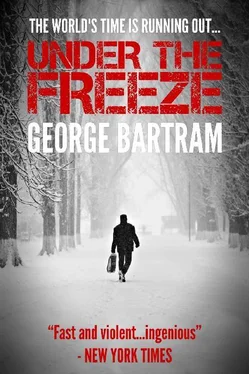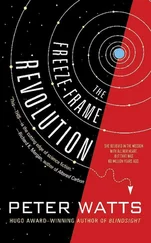Tarp walked away. When he was near the end of the passage, he heard quick footsteps.
“Where are you going? Sir?” It was the woman.
“Home.”
“Do not move another step!”
Tarp looked at her. “Shoot me. It would cap the evening for all of you.” He turned into the darkness and was gone.
He went into an Indian restaurant on the Queensway and washed the blood away. The tweed jacket was a mess, soaked in blood to the elbow. He soaked it again and again. It was Johnnie Carrington’s life, running down into the sewers.
Who’ll tell Harriet ? He thought of Johnnie’s beautiful, flirtatious wife. Who’ll tell Gillian ?
He had never seen such bungling before. Even for an operation put together too quickly, it had been mismanaged. It was a nightmare example of bad work, and MI-5 would be very lucky if some sort of question were not raised in the House of Commons.
And who’ll tell Gillian ?
He walked to the Bloomsbury hotel, where he still kept a room. He changed his clothes and put antiseptic on several cuts. He looked bad — pale, perhaps sick. I am sick . This is sickening . What I’ve done is sickening . On the way out, a woman in the lobby looked at him and looked away with that intensity that comes of wanting not to have seen something.
He reached the theater bar ahead of Mrs. Bentham and ordered a whiskey from a pretty woman before the act quite ended and the crowd poured in. His hand was shaking as he took it from her; he looked in a mirror and saw a man he hardly recognized.
He recognized Mrs. Bentham, however. She seemed not to have changed in eleven years. She was a quintessential Englishwoman of her class, conservative, assured, often rude in her insistence on politeness; red-cheeked with broken veins, too tight in her hairstyle, years behind in her fashions because of both economy and taste. After they had identified each other and she had made it clear that he was forgiven for being a boor, he was allowed to get her a shandy while she commandeered a table no bigger than a hat and defended it against other determined Englishwomen.
“How very nice!” she exclaimed when he put the drink in front of her. “How well you look!”
He murmured something. She meant the suit, of course, which was one of those from Hire Attire and made him look like an ambassador or a very well educated Mafia lawyer.
Mrs. Bentham was carrying a brand-new plastic briefcase that bulged with papers. “I loathe business!” she cried. She opened a piece of paper on the table in front of him. “My bill.”
He was paying not only for Mrs. Bentham, but also for two typists, three hundred and seven pages of photocopying, typing paper, and the plastic briefcase. “All of that is mine?” he said doubtfully.
“Once you pay the bill. I loathe business, don’t you? It is so cruel !” She bent forward. “I prefer a check.”
“I don’t have a London account.” That was not true, although it was true that he did not have a London account in the name of Rider. “I have to give you cash.”
“Ah, well.” She sniffed. “I hate business.” She looked around them. The bar was packed. “Handing money about looks so bad.”
Tarp took a plain piece of paper from the briefcase and folded it like an envelope, wrote her name on it, and put the money into it. He then laid the thing on the table between them. “I’ve added in twenty-five pounds for your transportation home.”
“Oh. How very thoughtful you are, when you put your mind to it.” When he looked down, the improvised envelope had vanished and she was snapping her purse shut. “They will blink the lights or ring the bell or whatever they do to end the interval at any moment!” she cried. “I must run.”
“Wait.” His tone stopped her. It was not often that she was stopped. “You have plenty of time. What have you found for me?”
“Everything. Within reason, I mean. The history of the Loyal , its mission in the South Atlantic; a complete crew roster for the year of the Homburg encounter. Several accounts of the Homburg’s sinking. Quite a nice biography of Admiral Pope-Ginna, the commanding officer. And so on. It runs to more than four hundred pages.”
“You’re very quick.”
“That’s what I’m paid to be.”
She started to get up, and he detained her with a hand. “Not yet. They haven’t called yet. What did you find about the Hombur g?”
“Not as much, of course. Most of that would be in Germany, I daresay. But I did find a recently unclassified document that was circulated in 1944. It was sent to the Loyal , in fact. The first lord had reason to believe that the Homburg was carrying Nazi gold to South America, as well as some important Nazi officials.”
“How much gold?”
“It’s in my report. About a hundred and fifty million pounds sterling — by today’s debased value, I mean.”
The bell rang. He felt her tense. “What Nazi officials?”
“That I couldn’t find. ‘Certain civilians,’ is all it said. Some of that is still classified.”
“Can you get at it?”
Her professional expertise had been challenged. “Mr. Rider, I know the Official Secrets Act better than the people who now enforce it. I do believe that I can ‘get at’ something that was classified in 1944.”
“Do, then.”
She stood up. Someone bumped her from behind, and a look of martyrdom attached itself to her face. “ Do you mind?” she bellowed over her shoulder. Several people looked guilty. She turned back to Tarp. “Call me tomorrow evening. I really must go”
To say that she faded into the mob would be wrong; rather, she parted it. She was a big woman.
Tarp sat at the small table until the bar was empty. He finished the whiskey.
“Want another?” the woman at the bar said. She smiled at him. He thought of what it would be like to linger over another drink there, to respond to that smile. Was she offering more than the whiskey? He supposed it might be fun to find out. “No, thanks,” he said.
The briefcase was heavy. He admired Mrs. Bentham’s strength as he walked out of the theater and looked for a cab. A light rain was falling now, barely more than a mist, but it made taxis hard to find. At last he gave up and found an underground station and rode out to where he had left the rented car. He put the briefcase into the back and drove up to Bloomsbury, where he parked it as close as he could to the phone booth where Jenny Barnwell would call.
The telephone jingled at one minute past ten.
“Well?”
“It’s me, who else? Got your message, obviously. What’s on?”
“How’s my Belgian friend?”
“Very quiet. Carries a gun, you know that? I don’t like messing with people carry guns; they’re troublemakers. Like you. What’s this call about, anyway? I could be boogying right now, if it weren’t for you.”
“Boogie tomorrow. Bring my friend to the same place where we met last night. Then I’ve got a job for you.”
“Oh, Christ! There goes my whole bleeding evening!”
“Naturally he’ll pay as if he’d stayed the night.”
“Naturally. You think money solves everything, don’t you! Bloody fucking American, that’s all you are. Violence and money, that’s all you people know.”
“I need a car, Jenny.”
“What, you want me to steal a car!”
“No, rent or borrow. Got to have good papers. For about a week. I’ll pay well.”
“It isn’t quite the time of day for the car rentals, chum. Still, I know some people. Take me a couple hours, you know.”
“No longer. I’m in a hurry.”
Читать дальше












